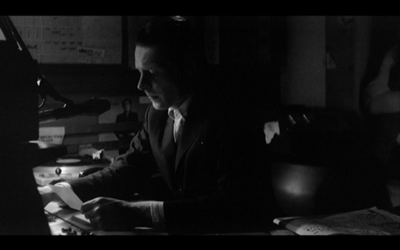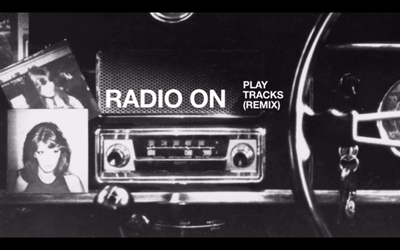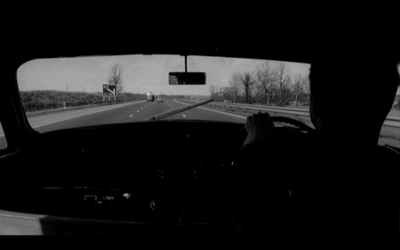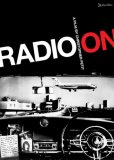| Reviews & Columns |
|
Reviews DVD TV on DVD Blu-ray 4K UHD International DVDs In Theaters Reviews by Studio Video Games Features Collector Series DVDs Easter Egg Database Interviews DVD Talk Radio Feature Articles Columns Anime Talk DVD Savant Horror DVDs The M.O.D. Squad Art House HD Talk Silent DVD
|
DVD Talk Forum |
|
|
| Resources |
|
DVD Price Search Customer Service #'s RCE Info Links |
|
Columns
|
|
|
Radio On
THE MOVIE:

Christopher Petit's 1979 independent feature, Radio On, is a brittle portrait of the despair and ennui of 1970s Britain. Rather than indulge in chronicling any particular scene from the time or resort to the usual ripped-from-the-headlines tactics, Petit instead chooses to follow one man over the course of a few days as a portrayal of the feelings of hopelessness many were experiencing. With bleak black-and-white cinematography by Martin Schäfer, who regularly worked with Wim Wenders (one of the producers on the film), Radio On offers a Britain that is perpetually gray. Come, Armageddon, come.
Robert (David Beames) is an all-night DJ in a factory who spends his own boring nights trying to alleviate the tedium of workers on the graveyard shift. He sets aside their banal requests and plays his own choices in hopes of giving them "something better." When his brother mysteriously dies, Robert goes on a road trip to Bristol in search of answers about what happened. Only those aren't the answers he really wants. The questions that loom over him are more existential. Though he never says so out loud, Robert is really searching for some kind of meaning in his dull existence.
Along the way, he meets other people who have been set adrift. There is the Scottish soldier (Andrew Byatt) whose pain at losing his friend on a tour of duty in Ireland has left him emotionally crippled and defensive. Then there is the pair of German women, one who hates all men and the other who is trying to find her ex-husband and reclaim custody of their daughter. Like Robert, these people feel that something has been taken from them, that their life is absurd and pointless. As the grieving mother explains, she feels homesick in England, stranded in a world where no one speaks the language she was born into. For her it may be a literal language barrier, but she might as well be speaking metaphorically. Robert borrows her phrase book and tries out different sayings in both English and German, and she kindly corrects his pronunciation. It doesn't matter that they are saying the same things, the sound of it will never match up.
If there is anything that provides comfort in Radio On, it's music. The DVD box quite loudly trumpets the soundtrack, listing the bands and the songs featured. The tracks are so important, Petit even lists them in the opening credits, rather than sticking them at the end like we're used to. The chosen cuts fit perfectly, the disaffected tones of the music emerging from the ashes of punk echoing the disaffection of Petit's script. Featured here are David Bowie, Kraftwerk, Robert Fripp, Ian Dury, Lene Lovich, Devo, and more. Regardless of what Robert is doing, he always returns to the music, turning on the radio in the car or playing a jukebox in a diner. It comforts him, acts as a friend when he has no one else to share the moment with.
At the same time, music also provides a bridge between people. The last message Robert received from his brother was a birthday present of an envelope full of Kraftwerk tapes. On the road, when he meets Just Like Eddie (Sting) at a gas station, they find common ground by singing Eddie Cochran songs, whereas when the soldier rejects what Robert puts on the stereo, you know their relationship will quickly end.
Petit builds Radio On out of lengthy, languorous shots, letting the landscape pass without comment, the periods of time where there is no dialogue stretching as far as the patches of road traversed. Schäfer keeps his camera at a distance rather than going in for the traditional close-ups, favoring two-person shots over cutting back and forth in the rare conversations. The viewer is kept far enough away as to feel that he or she is on the outside looking in, not unlike how Robert feels. We're the foreigners in his existence. Robert may not be engaged in what is happening, but there is turmoil, poverty, and moral decay all around him. The same radio that provides him with music also delivers the news of society's ills. These problems don't touch him, but they contribute to the dread that permeates the air.
By the end of Radio On, Robert has driven as far as he can go--quite literally. Parked on the edge of a deep hole, his car dies. Rather than fight against it, he opens his car doors and cranks up the Kraftwerk, the last gift from his brother and the DJ's last gift to the world he knew. He walks away from the site and starts walking back toward civilization. What he will find there is the Rorschach test Petit gives to his audience. What do you see in the ill-defined shapes of Robert's future? Has he rediscovered hope, or does the final shot of a train departing mean it's too late, any chance for humanity has already left the station?

THE DVD
Video:
Radio On has been put on DVD in widescreen at its original aspect ratio (1.78:1). The black-and-white generally looks pretty good, with deep, dark patches and evocative grays. Alternately, the blacks can also be a little hazy. There is also a lot of surface noise, but I am not sure that this wasn't left in intentionally. The scratches and spots and things kind of lend to the punk-rock feel of the movie.
Sound:
The Dolby mix has some real level issues. I don't know if it's intentional, but the music and the sound effects are much, much louder than the dialogue. You're going to notice this right away. The film opens with a long sequence of David Bowie performing "Heroes/Helden," and if you adjust your volume to have the song play at your comfort level, chances are when the first words are spoken, you won't be able to hear them. When you then turn up the volume to hear what is being said, the next song will blast out your speakers. I watched Radio On with my remote in my hand and was constantly having to adjust.
Extras:
In 1998, Christopher Petit made a 24-minute documentary called Radio On Remix. Though prefiguring the notion of DVD extras by several years, this short film pretty much subverts the idea of the compulsory "on location" featurette. Petit returns to the places Robert visited in the film, shooting them on low-fi video, usually from the window of a car so that we see it just as Robert saw it all over again. The new footage is spliced together with stills from the set and scenes from the film to create a visual collage. Rather than explain what we are seeing, Petit overlays cut-and-paste text lines that relate to what is being shown in only abstract ways. Sticking to the notion that music is necessary, all we hear is an avant-garde electronic score, with occasional snatches of sound from the various locations and a little bit of "Heroes." It's an appropriately rebellious supplemental film for a rebel filmmaker and his out-of-bounds movie. Radio On Remix shows how life has changed in two decades and subtlely gets you to question whether or not it was for the better.
The DVD also comes with an interior booklet featuring liner notes by film critic Sukhdev Sandhu. Sandhu makes an interesting case for Radio On as an ambient crime film. I saw it more as a hung-over kitchen sink drama, but I do like how he sets up his argument.
FINAL THOUGHTS:
Highly Recommended. Christopher Petit's Radio On is like a strange transmission from another time. A slow traveling road movie, it's the journey of an individual who has lost his way and is searching for some kind of meaning. Accompanied by an ever-present soundtrack of late '70s post-punk, he encounters other souls along the map who are also missing something. Eschewing a conventional set-up/complication/resolution narrative structure, Radio On brings to life the alienation, boredom, and despair of Britain in 1979, replicating those feelings and driving us to the outer edges of one man's soul.

Jamie S. Rich is a novelist and comic book writer. He is best known for his collaborations with Joelle Jones, including the hardboiled crime comic book You Have Killed Me, the challenging romance 12 Reasons Why I Love Her, and the 2007 prose novel Have You Seen the Horizon Lately?, for which Jones did the cover. All three were published by Oni Press. His most recent projects include the futuristic romance A Boy and a Girl with Natalie Nourigat; Archer Coe and the Thousand Natural Shocks, a loopy crime tale drawn by Dan Christensen; and the horror miniseries Madame Frankenstein, a collaboration with Megan Levens. Follow Rich's blog at Confessions123.com.
|
| Popular Reviews |
| Sponsored Links |
|
|
| Sponsored Links |
|
|
| Release List | Reviews | Shop | Newsletter | Forum | DVD Giveaways | Blu-Ray | Advertise |
|
Copyright 2024 DVDTalk.com All Rights Reserved. Legal Info, Privacy Policy, Terms of Use,
Manage Preferences,
Your Privacy Choices | |||||||













